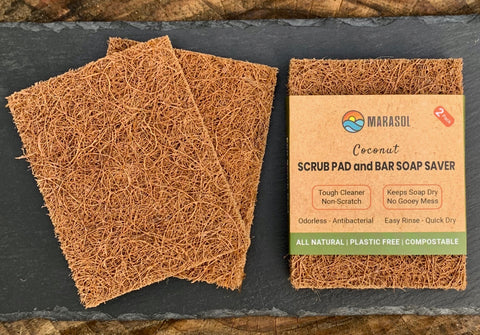Zero Waste Swap – Coconut Scrub Pad & Soap Saver

Eco-awakening on the Rise
With eco-awakening on the rise, people are looking for sustainable products that can help them minimize plastic waste.
If you have landed on this page, you are likely looking for zero waste products to add to your daily life. You might have already made the switch to reusable bottles, beeswax wraps, metal straws, and bamboo toothbrushes.
Well, we have your next zero waste swap; replace your plastic scrub pads and soap rests with coconut fiber pads.
What's so Bad About Scrub Pads and Soap Saver Pads?
Nearly all scrub pads and soap saver pads are made of plastic. Every year, billions of sponges, scrub pads, and soap savers are used and thrown away, forever to live on in landfills and our water.
The entire life-cycle of plastic products contributes to the warming of the planet. According to the estimates, plastic production could result in an annual 1.34 billion tons of greenhouse gas emissions by 2030 - nearly equivalent to what 300 500MW coal-fired power plants would produce. And every year, 11 million metric tons of plastic end up in the oceans.
Threat to Humans and Environment
Have you ever eaten a credit card? How about if you find out that the weekly intake of plastics among humans is 5 grams - the weight of a credit card. Sounds insane, right?
Scrub pads and soap saver pads are primarily made of plastic. If you look closely, you will find that even the "eco" and "nut" pads typically include plastic.
These all-plastic and half-plastic pads do not degrade completely. Some make their way to our oceans, where they break down into microplastics and are ingested by marine organisms, some that humans later consume.
Scrub pads are also a source of microplastic dust that can contribute to serious adverse human health outcomes, such as cancer, chronic inflammation, and neural disorders.
Bioplastics are Not the Answer
Many scrub pad and soap saver makers tout their use of bioplastic, which is plastic-like material made from plants or biological matter. Labeling products with "bio" implies they are sustainable and safe.
But, the reality is different.
Turning plant material into bioplastic requires significant chemical processing. And nearly all bioplastics are biodegradable only at high heat, in industrial composting facilities. There are few of these facilities, so bioplastics are most likely to sit in the landfill or our water. There they behave much like petroleum-based plastic and do not degrade, except into microplastics.
Zero Waste Alternatives
So, what are the options for consumers looking to reduce plastic consumption?
Don't worry; we have it covered.
There are now truly eco-friendly scrub pads and soap saver pads, giving consumers more sustainable and healthy choices.
Coconut fiber scrub pads
Coconut fiber pads are an excellent zero waste alternative to plastic scrub pads and soap rests. Made of coconut husk fibers and natural latex, they are all-natural and genuinely biodegradable and compostable.
The pads are made of upcycled coconut husks. The discarded husks would otherwise be sent to the landfill or burnt.
Coconut husk fiber (coir) functions well as a scrub pad. The fibers are tough enough to scrub while being absorbent and non-scratch. The pads are also effective when used to hold your bar soap and keep it dry and long-lasting.
If you are looking for new ways to cut out single-use plastics, then this coconut fiber pad could be your next zero-waste swap.
